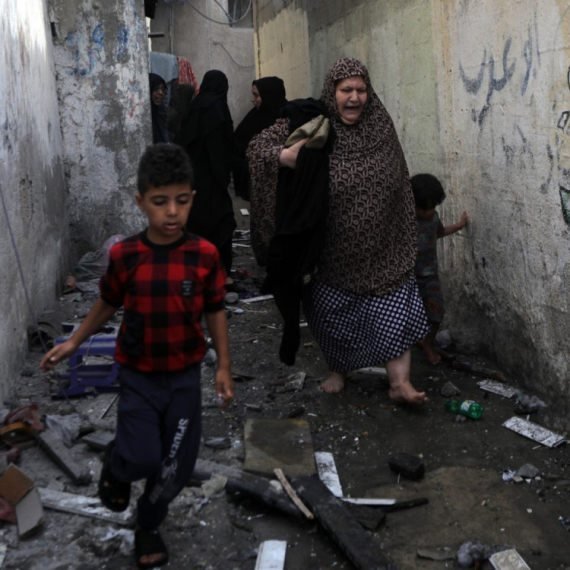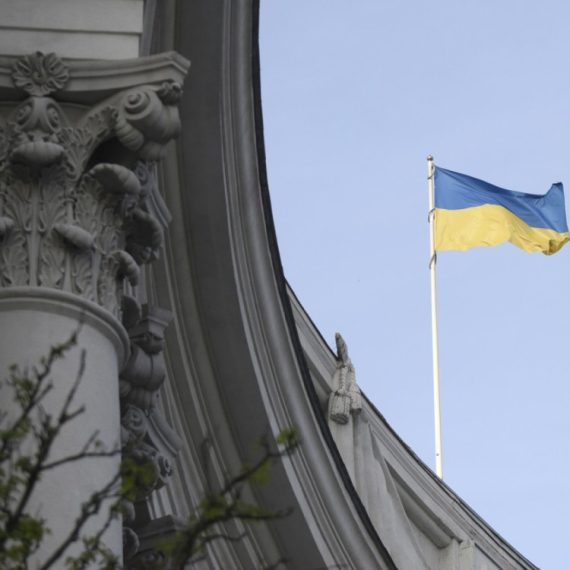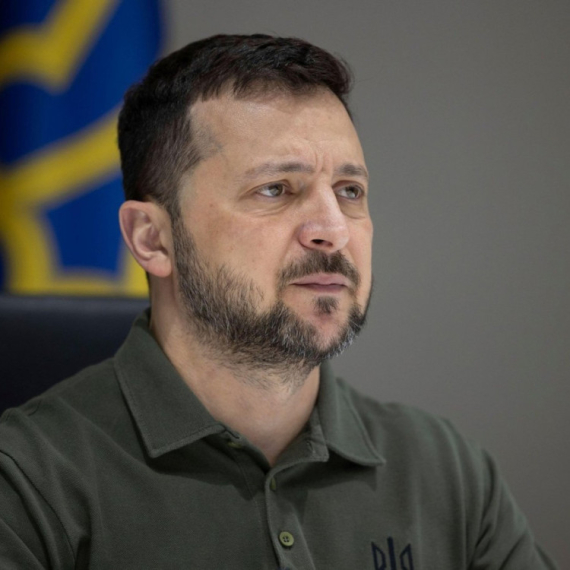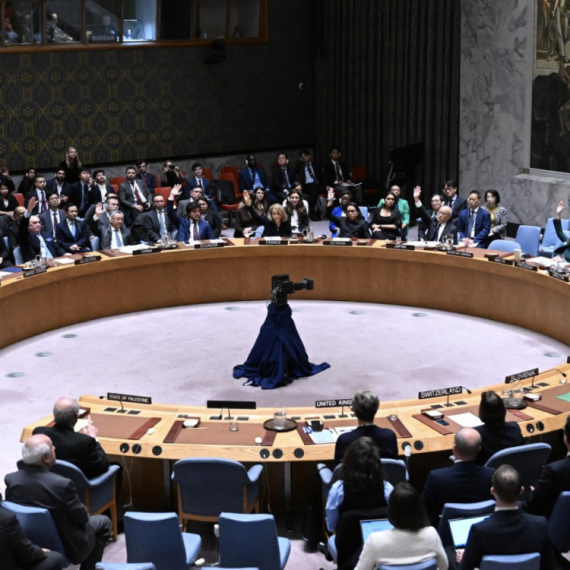Serbia ready to deal with migration issue, PM says
Serbian PM Ivica Dačić said Wednesday that Serbia was ready to fully commit to solving the problem of migrations both on the national and regional level.
Wednesday, 30.01.2013.
09:31

SARAJEVO Serbian PM Ivica Dacic said Wednesday that Serbia was ready to fully commit to solving the problem of migrations both on the national and regional level. "We need to improve cooperation between countries in the region on border security, which will enable people to move more easily and allow us to manage migrations more efficiently," Dacic said addressing participants of the the Regional Initiative on Migration, Asylum and Refugees (MARRI) in Sarajevo. Serbia ready to deal with migration issue, PM says "Serbia will undoubtedly continue to support and actively contribute to the development of existing cooperation and the formation of new national migration expert networks," he added. Delegations of Albania, Bosnia-Herzegovina, Montenegro, Croatia, Macedonia and Serbia and representatives of the International Organization for Migration (IOM), EU Delegation in Bosnia-Herzegovina, European Council and other institutions are attending the meeting. He explained that Serbia had recently been faced with a two-sided problem. “On one hand, Serbia has seen an increase in asylum requests, and on the other, Serbian citizens are going abroad and abusing the right to asylum, so the EU is pressuring us to bring these numbers down as soon as possible,” said the prime minister. "Serbia has taken a number of concrete measures and the number of fake asylum seekers has dropped considerably compared to previous years. The number of fake asylum seekers from Serbia in countries like Belgium, Sweden, Switzerland has dropped considerably, thanks both to measures taken by the Serbian government and measures taken by the countries themselves," stressed Dacic. “A rise was seen only in Germany, where over 8,000 Serbian citizens applied for asylum in 2012 - almost a half more than the year before, but even there a drop was recorded in November and December. For the first time since September 2012, Serbia did not top the list in the total number of asylum seekers,” said the prime minister. "We believe that this problem can be efficiently addressed only through joint measures and operations and better cooperation between countries, while one-sided pressures and threats to suspend the visa liberalization cannot accomplish the expected result," concluded Dacic. Ivica Dacic (Tanjug, file) PM meets with Bosnian Presidency chairman Dacic started his visit to Sarajevo with a meeting with Bosnia-Herzegovina Presidency Chairman Nebojsa Radmanovic in Sarajevo on Wednesday. Dacic pointed to Serbia's strong commitment to further develop good-neighborly relations, peace, security and stability in the region. Radmanovic stressed that "every visit of representatives of the two countries, including this one, shows the trend of progress in mutual relations," his office released in a statement. Radmanovic and Dacic both agreed that visits and contacts between representatives of the two countries should continue at bilateral and multilateral plan, because discussions, exchange of opinions and joint solving of all open issues between two countries contributed to deepening friendly relations between the peoples and citizens of the two countries and remove the mistrust of the past. Dacic also informed Radmanovic about the situation in Serbia, the dialogue with Pristina and on Serbia's commitment to improve regional relations. The two officials once again pointed to the two countries' joint commitment for European path and EU membership, adding that the process should be sped up. The meeting also tabled bilateral relations, promotion of cooperation, especially the agricultural one, which has been at a high level so far and which offers numerous possibilities for new improvements. Radmanovic informed Dacic on the current political situation in Bosnia-Herzegovina, reform processes in the country and expectations for the future in terms of the EU integration. He also voiced satisfaction with the fact that Bosnia-Herzegovina's Presidency would pay a visit to Serbia in 2013. Dacic arrived in Sarajevo late last night. Later today he will meet with with Bosnia-Herzegovina Council of Ministers Chairman Vjekoslav Bevanda and EU Special Representative for Bosnia-Herzegovina Peter Sorensen. The Serbian prime minister said earlier that he had come to Sarajevo as an interior minister and stressed that he “will meet with other colleagues as well”. “Especially because I expect my colleague Mr. Vjekoslav Bevanda in Belgrade next week,” Dacic said. He added that only one topic would be discussed in Sarajevo. “And that is how to improve relations, how to be practical and to look for common interests. I think we have plenty of them,” Dacic explained. Ivica Dacic and Nebojsa Radmanovic (Tanjug) Beta Tanjug Anadolu
Serbia ready to deal with migration issue, PM says
"Serbia will undoubtedly continue to support and actively contribute to the development of existing cooperation and the formation of new national migration expert networks," he added.Delegations of Albania, Bosnia-Herzegovina, Montenegro, Croatia, Macedonia and Serbia and representatives of the International Organization for Migration (IOM), EU Delegation in Bosnia-Herzegovina, European Council and other institutions are attending the meeting.
He explained that Serbia had recently been faced with a two-sided problem.
“On one hand, Serbia has seen an increase in asylum requests, and on the other, Serbian citizens are going abroad and abusing the right to asylum, so the EU is pressuring us to bring these numbers down as soon as possible,” said the prime minister.
"Serbia has taken a number of concrete measures and the number of fake asylum seekers has dropped considerably compared to previous years. The number of fake asylum seekers from Serbia in countries like Belgium, Sweden, Switzerland has dropped considerably, thanks both to measures taken by the Serbian government and measures taken by the countries themselves," stressed Dačić.
“A rise was seen only in Germany, where over 8,000 Serbian citizens applied for asylum in 2012 - almost a half more than the year before, but even there a drop was recorded in November and December. For the first time since September 2012, Serbia did not top the list in the total number of asylum seekers,” said the prime minister.
"We believe that this problem can be efficiently addressed only through joint measures and operations and better cooperation between countries, while one-sided pressures and threats to suspend the visa liberalization cannot accomplish the expected result," concluded Dačić.
PM meets with Bosnian Presidency chairman

Dačić pointed to Serbia's strong commitment to further develop good-neighborly relations, peace, security and stability in the region.
Radmanović stressed that "every visit of representatives of the two countries, including this one, shows the trend of progress in mutual relations," his office released in a statement.
Radmanović and Dačić both agreed that visits and contacts between representatives of the two countries should continue at bilateral and multilateral plan, because discussions, exchange of opinions and joint solving of all open issues between two countries contributed to deepening friendly relations between the peoples and citizens of the two countries and remove the mistrust of the past.
Dačić also informed Radmanović about the situation in Serbia, the dialogue with Priština and on Serbia's commitment to improve regional relations.
The two officials once again pointed to the two countries' joint commitment for European path and EU membership, adding that the process should be sped up.
The meeting also tabled bilateral relations, promotion of cooperation, especially the agricultural one, which has been at a high level so far and which offers numerous possibilities for new improvements.
Radmanović informed Dačić on the current political situation in Bosnia-Herzegovina, reform processes in the country and expectations for the future in terms of the EU integration.
He also voiced satisfaction with the fact that Bosnia-Herzegovina's Presidency would pay a visit to Serbia in 2013.
Dačić arrived in Sarajevo late last night. Later today he will meet with with Bosnia-Herzegovina Council of Ministers Chairman Vjekoslav Bevanda and EU Special Representative for Bosnia-Herzegovina Peter Sorensen.
The Serbian prime minister said earlier that he had come to Sarajevo as an interior minister and stressed that he “will meet with other colleagues as well”.
“Especially because I expect my colleague Mr. Vjekoslav Bevanda in Belgrade next week,” Dačić said.
He added that only one topic would be discussed in Sarajevo.
“And that is how to improve relations, how to be practical and to look for common interests. I think we have plenty of them,” Dačić explained.





















































Komentari 1
Pogledaj komentare